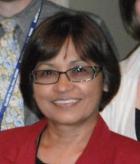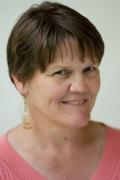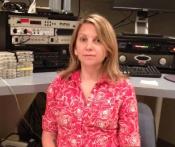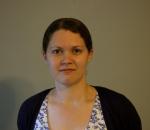- About Archives
- About SAA
- Careers
- Education
- Publications
- Advocacy
- Membership
Vice Chair/Chair-Elect:
Cecilia L. Salvatore
Dominican University
Steering Committee Candidates:
Jackie Couture
Eastern Kentucky University
Heather Fox
The Filson Historical Society
Rachel Telford
Veterans History Project
Cecilia Salvatore
 Cecilia L. Salvatore. C.A., MLS, Ph.D (University of Texas at Austin, 2000), coordinates and teaches in the Archival and Cultural Heritage Studies Program at Dominican University’s Graduate School of Library and Information Science (River Forest, Illinois). She previously coordinated and taught in the Archives Studies Program at Emporia State University. She first began conducting oral history interviews when she was the Pacific Collections Librarian/Curator at the Micronesian Area Research Center (MARC) at the University of Guam. Through a Guam Humanities Council grant project, she conducted oral history interviews of indigenous elderly based on MARC’s historical photo collection. She recognized then the importance of oral history interviews and the preservation of these interviews, especially as they focus on those who have been marginalized in history and whose stories have been missing from history books.
Cecilia L. Salvatore. C.A., MLS, Ph.D (University of Texas at Austin, 2000), coordinates and teaches in the Archival and Cultural Heritage Studies Program at Dominican University’s Graduate School of Library and Information Science (River Forest, Illinois). She previously coordinated and taught in the Archives Studies Program at Emporia State University. She first began conducting oral history interviews when she was the Pacific Collections Librarian/Curator at the Micronesian Area Research Center (MARC) at the University of Guam. Through a Guam Humanities Council grant project, she conducted oral history interviews of indigenous elderly based on MARC’s historical photo collection. She recognized then the importance of oral history interviews and the preservation of these interviews, especially as they focus on those who have been marginalized in history and whose stories have been missing from history books.
She continues to work and consult on oral history projects in the Pacific Islands. She enjoys sharing the exciting developments in oral history interview methods, standards, and technology with diverse, marginalized communities. At Dominican University, she introduced two new courses on cultural heritage resources and services, which include oral history interviews and preservation as a core component. This summer, she is an instructor at TheHistoryMakers: the Nation’s Largest African American Video Oral History Collection, for its IMLS-funded Fellowship, Mentoring, Training and Placement Institute. She is a member of SAA, ALA, the Oral History Association, and the Pacific Branch of the International Council on Archives (PARBICA).
Jackie Couture

Oral history is an important tool to fill in the gaps of the written record by providing researchers with an inside look into the people, places and events of history. Its role in giving a voice to the under-documented is especially important to have a more complete historical record for the future. I am currently working on an oral history project documenting the citizen activism relating to nerve gas incineration at the Blue Grass Army Depot. This oral history record is providing insights into the thought processes behind the actions taken by the activists that the written record cannot provide.
In my position as Digital Projects Archivist at Eastern Kentucky University, I have worked extensively with oral history to preserve our collections and to make them more accessible to researchers. Over the past ten years we have inventoried the entire collection, adding subject headings and detailed information about each interview. More recently we have been digitizing the interviews and paper transcripts to preserve and to provide better access to collections. I have presented on oral history at the Best Practices Exchange and will be presenting at the Kentucky Library Association fall meeting.
Besides managing oral history collections, I recently spearheaded the initiative to revive the Oral History Center at EKU and will serve as co-director of that facility. The center will officially open in October when it will be dedicated and named after William Berge.
Heather Fox
I came to oral his tory in my first semester of graduate school working as a student assistant indexing the Kentucky Legislature Oral History Project. As my interest in oral history grew, I arranged a semester-long professional field experience with the University of Louisville in which I helped reformat and catalog their African American Oral History collection and put the interviews online. Listening to the recordings reinforced my understanding of the power of oral history to capture the untold stories of people within a community. After graduating, I worked on a grant-funded project for the University of Louisville as a data wrangler, a job that included preparing digital files for inclusion in a distributed digital preservation network.
tory in my first semester of graduate school working as a student assistant indexing the Kentucky Legislature Oral History Project. As my interest in oral history grew, I arranged a semester-long professional field experience with the University of Louisville in which I helped reformat and catalog their African American Oral History collection and put the interviews online. Listening to the recordings reinforced my understanding of the power of oral history to capture the untold stories of people within a community. After graduating, I worked on a grant-funded project for the University of Louisville as a data wrangler, a job that included preparing digital files for inclusion in a distributed digital preservation network.
These experiences introduced me not only to oral history, but also to methods of providing online access to them and considering methods of digital preservation. They also prepared me for my current work as project archivist for the Kentucky Historical Society managing the creation of a statewide online portal to oral history collections information. Built upon an open source platform, this project aims to be sustainable and user-friendly from both a back-end and front-end perspective. By focusing on these two goals, we hope to not only broaden the use of this important source of documentation but also harness the power of the Internet to strengthen connections between people.
I have a master’s degree in library science from the University of Kentucky. I have been a member of the oral history section of SAA since I joined the organization in 2008. I work at the Kentucky Historical Society as project archivist for an NEH-funded grant project called Pass the Word mentioned above. I will be presenting my work on this project at the Oral History Association in Cleveland, Ohio in the fall. I am also currently co-organizing a project with the University of Louisville Oral History Center documenting WHAS radio, a Louisville station that has had a major impact on the community.
Finally, one of the reasons I believe in oral history is that it is a means of connecting—connecting on a more visceral level than simply written documentation. I enjoy bringing people together and I welcome the opportunity to serve on the steering committee and to use my skills as a connector for your benefit.
Rachel Telford
 My first exposure to oral history was an assignment for a college history class focused on women in 20th century America. I interviewed a family friend about her experience as an immigrant in the 1970s, and despite having known her for more than a decade, I learned a great deal about her life. But I hadn’t received much guidance on how to conduct an interview, and I failed to broach the subjects I truly wanted to ask about. Although I probably got a decent grade, it really was not a successful interview.
My first exposure to oral history was an assignment for a college history class focused on women in 20th century America. I interviewed a family friend about her experience as an immigrant in the 1970s, and despite having known her for more than a decade, I learned a great deal about her life. But I hadn’t received much guidance on how to conduct an interview, and I failed to broach the subjects I truly wanted to ask about. Although I probably got a decent grade, it really was not a successful interview.
Now, as a Program Specialist with the Veterans History Project at the Library of Congress, I have the opportunity to work with oral histories conducted by donors from around the country. Our collections come from professionals with years of experience, passionate volunteers, and students who may be just as much in need of guidance as I once was. In working with these collections, I have come to appreciate the rich cultural importance and research value of oral histories, as well as the need for education, outreach, and collaboration, to ensure that interviewers have the tools they need to preserve their subject’s history, and that those histories are available to all who seek to learn from them.
My work at VHP covers everything from description and access to donor relations and exhibition curation, with many special projects in between. Currently, I am working on a pilot project to evaluate the feasibility of using video-chat applications, such as Skype, to conduct oral history interviews remotely.
I received my MLS with a specialization in Archives, Records and Information Management from the University of Maryland, and my BA in History from the University of California, Davis. I have been a member of SAA since 2005, and I would be honored to serve the Oral History Section on its Steering Committee.